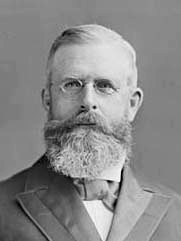Sir William Mulock | |
|---|---|
 Mulock at age 53 (1896) | |
| Acting Lieutenant Governor of Ontario | |
| In office October 25, 1931 – November 1, 1932 | |
| Monarch | George V |
| Governor General | The Earl of Bessborough |
| Premier | George Stewart Henry |
| Preceded by | William Donald Ross |
| Succeeded by | Herbert Alexander Bruce |
| Chief Justice of Ontario | |
| In office 1923–1936 | |
| Preceded by | Sir William Ralph Meredith |
| Succeeded by | Newton Rowell |
| Member of the Canadian Parliament for York North | |
| In office June 20, 1882 – October 15, 1905 | |
| Preceded by | Frederick William Strange |
| Succeeded by | Allen Bristol Aylesworth |
| Personal details | |
| Born | January 19, 1843 Bond Head, Canada West |
| Died | October 1, 1944 (aged 101) Toronto, Ontario, Canada |
| Spouse | Sarah Ellen Crowther |
| Children | 6 |
| Occupation | Lawyer, businessman, educator, farmer, politician, judge, and philanthropist |
| Known for | Federation of University of Toronto, Imperial Penny Post, Canadian Department of Labour, bringing Mackenzie King into public life |
Sir William Mulock PC, PC (Can), KCMG, KC (January 19, 1843[1][2] – October 1, 1944) was a Canadian lawyer, businessman, educator, farmer, politician, judge, and philanthropist. He served as vice-chancellor of the University of Toronto from 1881 to 1900, negotiating the federation of denominational colleges and professional schools into a modern university.
He was elected to the House of Commons of Canada as a Liberal Member of Parliament and served from 1882 to 1905. Sir Wilfrid Laurier appointed him to the Canadian Cabinet as Postmaster General from 1896 to 1905. In 1900, Mulock established the Department of Labour, bringing William Lyon Mackenzie King into public life as his Deputy Minister.
He initiated the final agreement for a transpacific cable linking Canada to Australia and New Zealand, and he funded Marconi to establish the first transatlantic radio link from North America to Europe. In 1905, he chaired the parliamentary inquiry into telephones that led to regulation of Canadian telecommunications, and he participated in the negotiations that led to the creation of the provinces of Alberta and Saskatchewan.
He was Chief Justice of the Exchequer Division of the Supreme Court of Ontario from 1905 until appointed by King in 1923 as Chief Justice of the Supreme Court of Ontario, a position he held until 1936. From 1931 to 1932, he served as the acting Lieutenant Governor of Ontario.
Mulock was extremely active in both business and the community, being involved in the foundation of organizations as diverse as the Toronto-Dominion Bank, the Toronto Star, Toronto Wellesley Hospital, and Canada's first national peace organization. In later life, he was known as the "Grand Old Man" of Canada.
- ^ Most sources after 1914 incorrectly list Mulock's birth year as 1844. See "Old Reference Books raise a question". The Globe and Mail. 20 January 1944. p. 22. Mulock's birth was not registered (Loudon, p. 185), and after Mulock's death his grandson reported that the family bible recorded the birth year as 1843. See Globe and Mail Obituary and Toronto Star Obituary
- ^ "MULOCK, Hon. Sir William". Who's Who. Vol. 59. 1907. p. 1273.